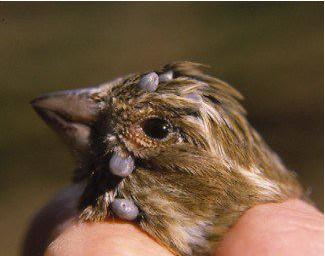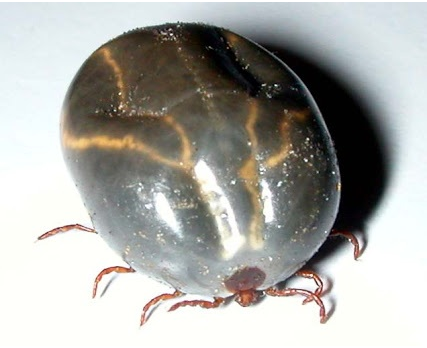A number of farmers have called asking us about chicken parasites and particularly the ticks and the chicken louse (lice). It is not uncommon for Chicken parasites to be found among poultry and particularly in the backyard system of keeping chicken. There are many external parasites and the most common are lice, mites, fowl tick, and chiggers.

Some farmers have long accepted them as a way of life that they do not even make attempts to get rid of them. However this is walking a dangerous path since these parasites can cause anemia, damaged feathers, weight problems, poor laying, or — in young birds — death.A number of lice and mites infect birds and cause severe irritation which leads to loss of feathers, loss of weight and low numbers of eggs.Small ticks feed on the blood of birds and can carry germs which will cause other diseases.

These pests hide in the walls, floors and bedding of the cages and houses where chicken are kept. In order to control the parasites it is necessary to keep these places clean and kill any parasites there.
Normally these are brought about by poor hygiene and proper maintenance of the chicken house. Many farmers for example do not fumigate ( disinfect) the house before introducing new birds in a house or after removing old ones.
The tell-tale signs that you may be having parasites e.g. ticks in your chicken house are:
- They may be seen crawling on the chickens or in the chicken house.
- Chickens with broken, chewed-looking feathers and reddened skin patches
- Chicken scratching and picking at themselves most of the time.
- A decrease in egg production
- Anemia with pale combs and wattles (red flesh hanging under the neck).
- A fluffed-up or sick appearance
- Some can be noticed when they bite humans inside the chicken house.
Help your confined chickens keep parasites away by giving them a large, deep box of sand to wallow in. Dust smothers and dislodges the parasite and cleans the body of oils, dust, and debris that some parasites feed on. Free-range chickens make their own wallows. Also, don’t let wild birds nest or roost in chicken shelters.
Why you should keep parasites at bay
- To make your chicken as comfortable and healthy as possible.
- For optimum production.
- To avoid incidences of other diseases affecting your birds.
- To avoid anaemia.
- To avoid death in extreme cases of attack of young birds.
NB: Scaly leg of chickens can be treated by dipping the leg in paraffin (kerosene) and then gently brushing the leg. Paraffin must not be allowed to touch the skin or feathers.
Fowl Tick (Blue Bug)
The Fowl Tick (Argaspersicus) may be a serious parasite of poultry if it unchecked and multiplies in poultry houses or on poultry ranges. It sucks blood, and when present in large numbers it results in weakened birds, reduced egg production, emaciation and even death. The tick is very hardy and resilient. Ticks have been kept alive without food for more than three years. The ticks will feed on all fowl.
Fowl ticks spend most of their lives in cracks and hiding places, emerging at night to take a blood meal. Mating takes place in the hiding areas. A few days after feeding, the female lays a batch of eggs. In warm weather the eggs hatch within fourteen days. In cold weather they may take up to three months to hatch. Larvae that hatch from the eggs crawl around until they find a host fowl. They remain attached to the birds for three to ten days. After leaving the birds they find hiding places and molt before seeking another blood meal. This is followed by additional moltings and blood meals.
Ticks are difficult to eradicate and methods employed must be performed carefully. It is not necessary to treat the birds, but houses and surrounding areas must be treated thoroughly.
Jiggers, Red Bugs or Harvest Mites
These pests attack chickens and turkeys, as well as humans. Normally these small mites feed on wild animals, birds, snakes and lizards. Only the larvae of jiggers attack poultry or animals; adult mites feed on plants.
Larvae usually attach to the wings, breasts and necks of poultry. They inject a poisonous substance that sets up local irritation and itching. After a few days, the larvae become engorged and drop off. Injury to grown fowl may not be apparent or noticed until the bird is dressed; then the lesions are readily apparent and greatly reduce the carcass value. Young chickens become droopy, refuse to eat and die. Due to methods of raising poultry, turkeys are more affected than chickens.
Control of External Parasites
There are many insecticides available to help control external poultry parasites. The most effective broad spectrum insecticide is permethrin. Permethrin has a significant residual activity, thus making it ideal for treating facilities and equipment. At reduced concentrations it can be applied to the bird. In the absence of Permethrin ask your local veterinarian for an alternative.Follow all manufacturers recommendations when using all insecticides!
Chicken lice
Lice are long, narrow, tiny insects that move quickly when you part a chicken’s feathers. The eggs are small dots glued to feathers. When your chicken has a heavy infestation, you can see the lice scurrying around on the bird. Unlike human lice, chicken lice don’t feed on blood; they eat feathers or shedding skin cells. There are head lice, body lice, and lice that live on feather shafts.
To control lice you have to treat the birds directly — treating the environment doesn’t work. Permethrin, natural pyrethrum, and carbaryl dust are effective insecticides for lice, but you must consult a vet for the correct way to use them on chickens.
Cleaning cages and houses
If birds are infected with external parasites it will be necessary to thoroughly clean out cages and houses. All bedding and dirt must be removed and all parts of the equipment should be thoroughly scrubbed with soap and hot water. If possible you should then spray or paint the equipment with a mixture of paraffin and creosote in equal amounts or with nicotine sulphate (40%). Your veterinary service will advise you on what is available locally for you to use.
You can use a hand pump to spray houses. You can spray with a treatment for external parasites and your veterinary officer can advise you on this.
Prevention of parasites in Poultry
The major means of control is keeping birds in clean conditions and stopping them from wandering outside protected areas. The reason we recommend a fenced off chicken run or a fenced off home compound.
- Cages and houses should be kept clean with droppings removed every week.
- Feed and water containers should be cleaned out every day.
- Do not allow wet muddy areas to develop around water containers or anywhere else.
- Cages and houses should be thoroughly cleaned before new birds are placed in them.
- Do not keep birds on the same area of ground year after year as contamination of the soil will increase.
- Separate young birds from older birds..
- Do not place young birds, especially under 3 months old, in runs where older birds have recently been kept as they may develop infection with coccidia.
- It is recommended that you regularly treat your chicken forcoccidian.
For further help, get a copy of our manuals or consult your local veterinarian!